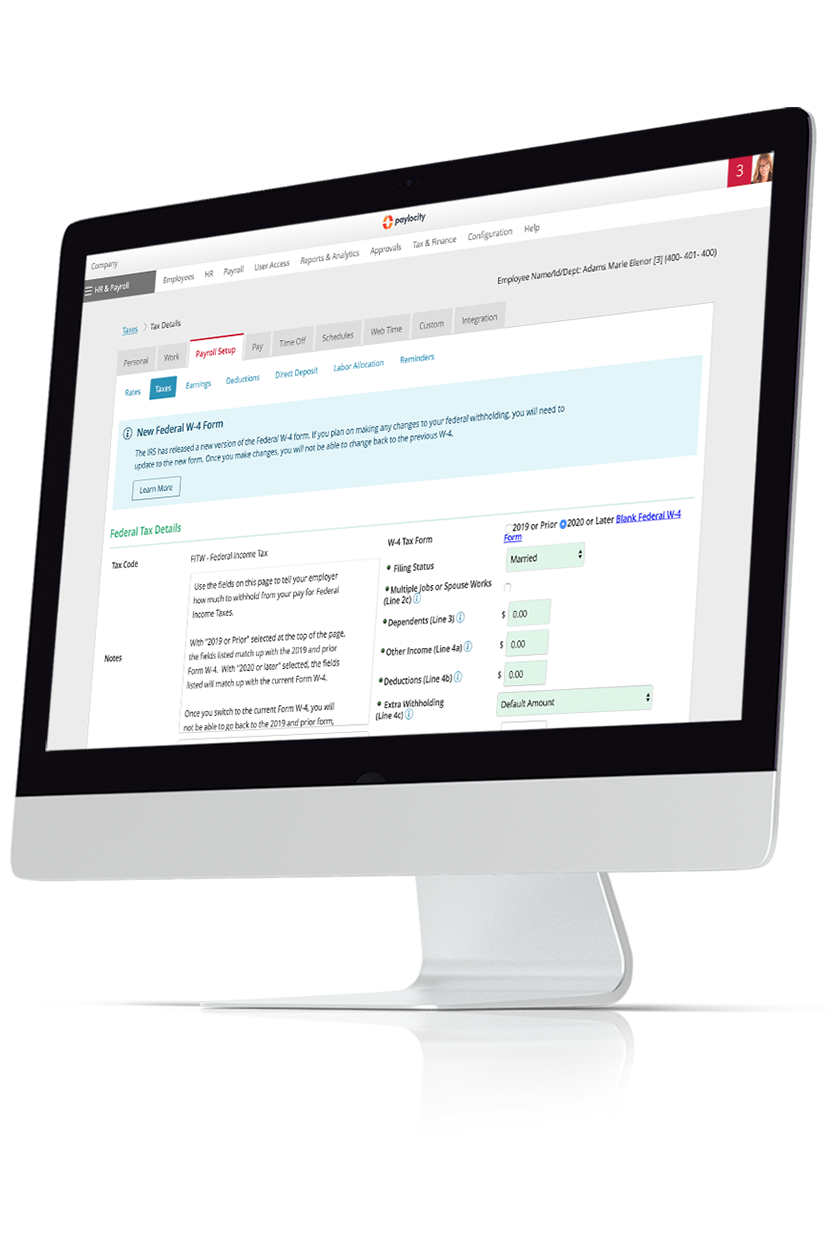California Payroll Tax Facts
January 08, 2025
Having to comply with unique state taxes and wage laws can make processing payroll doubly daunting. Here’s everything you need to know about these rates and laws for the state of California.

Not only does California have one of the highest minimum wage rates in the country, it also has nearly 50 different local minimum wage rates across the state. The state is also one of the few with a State Disability Insurance program for employees who can't work due to a non-work-related injury or illness.
When it comes to processing payroll, California-based organizations must handle the following taxes in addition to those required by the federal government:
- Personal Income (a.k.a. State Income Tax)
- State Unemployment Insurance (SUI)
- State Disability Insurance (SDI)
- Employment Training Tax (ETT)
- C-Corporation Tax
The below information was last updated January 8, 2025. It is not intended as legal or tax advice.
California Payroll Tax Rates
California State Income Tax (SIT)
California's SIT is progressive, meaning it adjusts based on the income level of the employee paying the tax. In addition to the brackets below, there's an extra 1.1% tax applied to those earning $1 million dollars or more annually.
|
Filing Status |
Income |
2025 Income Tax Rate |
| Single / Married (filed separately) | $0 - $10,756 | 1.10% of excess over $0 |
| $10,756 - $25,499 | $118.32 + 2.20% of excess over $10,756 | |
| $25,499 - $40,245 | $442.67 + 4.40% of excess over $25,499 | |
| $40,245 - $55,866 | $1,091.49 + 6.60% of excess over $40,245 | |
| $55,866 - $70,606 | $2,122.48 + 8.80% of excess over $55,866 | |
| $70,606 - $360,659 | $3,419.60 + 10.23% of excess over $70,606 | |
| $360,659 - $432,787 | $33,092.02 + 11.33% of excess over $360,659 | |
| $432,787 - $721,314 | $41,264.12 + 12.43% of excess over $432,787 | |
| $721,314 - $1,000,000 | $77,128.03 + 13.53% of excess over $721,314 | |
| $1,000,000 or greater | $114,834.25 + 14.63% of excess over $1,000,000 | |
| Married (filed jointly) | $0 - $21,512 | 1.10% of excess over $0 |
| $21,512 - $50,998 | $236.63 + 2.20% of excess over $21,512 | |
| $50,998 - $80,490 | $885.32 + 4.40% of excess over $50,998 | |
| $80,490 - $111,732 | $2,182.97 + 6.60% of excess over $80,490 | |
| $111,732 - $141,212 | $4,244.94 + 8.80% of excess over $111,732 | |
| $141,212 - $721,318 | $6,839.18 + 10.23% of excess over $141,212 | |
| $721,318 - $865,574 | $66,184.02 + 11.33% of excess over $721,318 | |
| $865,574 - $1,000,000 | $82,528.22 + 12.43% of excess over $865,574 | |
| $1,000,000 - $1,442,628 | $99,237.37 + 13.53% of excess over $1,000,000 | |
| $1,442,628 or greater | $159,124.94 + 14.63% of excess over $1,442,628 | |
| Head of Household | $0 - $21,527 | 1.10% of excess over $0 |
| $21,527 - $51,000 | $236.80 + 2.20% of excess over $21,527 | |
| $51,000 - $65,744 | $885.21 + 4.40% of excess over $51,000 | |
| $65,744 - $81,364 | $1,533.95 + 6.60% of excess over $65,744 | |
| $81,364 - $96,107 | $2,564.87 + 8.80% of excess over $81,364 | |
| $96,107 - $490,493 | $3,862.25 + 10.23% of excess over $96,107 | |
| $490,493 - $588,593 | $44,207.94 + 11.33% of excess over $490,493 | |
| $588,593 - $980,987 | $55,322.67 + 12.43% of excess over $588,593 | |
| $980,987 - $1,000,000 | $104,097.24 + 13.53% of excess over $980,987 | |
| $1,000,000 or greater | $106,669.70 + 14.63% of excess over $1,000,000 |
|
Additional California SIT Details |
|
|
Supplemental Withholding Computation |
Flat rate of 6.6% or 10.23% for stock options/bonuses |
|
Valid Filing Statuses |
|
|
Exemptions (rates) |
|
|
Exemptions (individuals) |
|
|
Form W-4 |
Form DE-4 (for employees hired on or after January 1, 2020) |
|
Reconciliation Frequency |
Quarterly |
California State Unemployment Insurance (SUI)
SUI provides unemployment benefits to eligible workers who are unemployed through no fault of their own (as determined by state law) and meet the state’s eligibility requirements.
|
California SUI Tax Details |
|
|
Taxable Wage Base |
$7,000 |
|
Employee Subject to Tax |
No |
|
Rates for Experienced Employers |
1.5% – 6.2% (Schedule F+) |
|
Rates for New Employers |
3.4% |
|
Effective Period |
Calendar Year |
|
Voluntary Contributions Allowed |
Yes; last working day in March (not permitted though when Schedule E, F, or the emergency solvency surcharge are in effect). |
California State Disability Insurance (SDI)
SDI benefits are normally funded by employees through mandatory payroll deductions from each paycheck. While employers don't contribute to these deductions, they are required to collect and remit said deductions to the state on each employee’s behalf.
| California SDI Details | |
|
Maximum Taxable Earnings |
No limit |
|
Employee Deduction Rate |
1.2% |
|
Maximum Employee Deduction Amount |
No limit |
|
Employer Contribution |
No |
Employers can also opt to carry their own insurance (a.k.a. voluntary plans or VDI). If an employer chooses a voluntary plan, they’re required to pay a VDI assessment of 0.168%.
California Paid Sick Leave (PSL) Tax
The state of California doesn’t require employers to collect PSL taxes, but it does have a program providing such leave to eligible employees:
|
California PSL Details |
|
|
Covered Employees |
Any who have worked at least 30 days in the state |
|
Covered Employers |
Any that has at least one employee who works more than 30 days in a year within the state. |
|
Accrual Method(s) |
One hour per 30 hours worked |
|
Annual Accrual Maximum |
80 hours |
| Annual Use Maximum | 40 hours |
|
Carryover Maximum |
Limited to accrual maximum |
|
Probationary Period |
Yes; 90 calendar days |
|
Frontloading Allowed |
Yes |
|
Record Retention |
3 years |
|
FAQs |
|
California Paid Family and Medical Leave (PFML) Tax
California uses employee contributions to the state's SDI fund (see above) to fund its Paid Family Leave (PFL) program. This is why one of the eligibility requirements for employees is whether they have made SDI contributions in the past. Since the program only replaces 60% - 70% of an employee's wages, employers may allow employees to use other forms of paid time off (e.g., sick time, vacation time, etc.) to supplement and receive 100% of their pay while on leave.
|
California PFL Details |
|
|
Covered Employees |
Part-time or full-time employees who have made SDI contributions |
|
Covered Employers |
All with 5 or more employees |
|
Amount of Leave |
Up to 8 weeks |
| Tax Rate | 1.2% |
|
Wage Replacement |
60% - 70% of wages earned 5-18 months before filing a claim |
| Acceptable Uses |
|
California Employment Training Tax (ETT)
To assist with the workforce development programs, employees within California also pay an ETT of 0.1% of wages up to $7,000 (i.e., $7 a year).
California C-Corporation Tax
C corporations in California also pay an 8.84% corporate income tax if they receive income in the state and are incorporated, registered to do business in, and actually doing business in California. This tax doesn't apply to S corporations, but some shareholders may have to pay personal income tax on their share of an S corporation’s income.
Miscellaneous California Tax Information
California Reciprocal Agreement(s)
Reciprocal agreements are when workers who live and work in different states are only required to pay taxes to the state where they live. California doesn’t currently have any reciprocal agreements, but residents in the following states are allowed a tax credit towards their SITs for taxes paid to their home state:
- Arizona
- Guam
- Indiana
- Oregon
- Virginia
California Minimum Wage Rates
|
Wage Type |
California Rates |
Federal Rates |
|
Minimum Wage |
$16.50 |
$7.25 |
|
Tipped Minimum Wage |
$16.50 |
$2.13 |
|
Actual Tip Credit |
N/A |
$5.12 |
In addition to the state-wide minimum wage rates above, some cities and counties have unique minimum wage rates too:
|
Location |
Wage Rate |
|
Alameda City |
$17.00 |
|
Belmont |
$18.30 |
|
Berkeley |
$18.67 |
|
Burlingame |
$17.43 |
|
Cupertino |
$18.20 |
|
Daly City |
$17.07 |
|
East Palo Alto |
$17.45 |
|
El Cerrito |
$18.34 |
|
Emeryville |
$19.36 |
|
Fremont |
$17.30 |
|
Foster City |
$17.39 |
|
Half Moon Bay |
$17.47 |
|
Hayward |
$16.50 (small employer) |
|
Long Beach |
$16.73 (hotel) |
|
Los Altos |
$18.20 |
|
Los Angeles |
$17.28 (city) |
|
Malibu |
$17.27 |
|
Menlo Park |
$17.10 |
|
Milpitas |
$17.70 |
|
Mountain View |
$19.20 |
|
Novato City |
$16.50 (small employer; 1-25 employees) |
|
Oakland |
$16.89 |
|
Palo Alto |
$18.20 |
|
Pasadena |
$17.50 |
|
Petaluma |
$17.97 |
|
Redwood City |
$18.20 |
|
Richmond |
$17.77 |
|
San Carlos |
$17.32 |
|
San Diego |
$17.25 |
|
San Francisco |
$18.67 |
|
San Jose |
$17.95 |
|
San Mateo |
$17.95 |
|
Santa Clara |
$18.20 |
|
Santa Monica |
$17.27 |
|
Santa Rosa |
$17.87 |
|
Sonoma |
$16.96 (small employer) |
|
South San Francisco |
$17.70 |
|
Sunnyvale |
$19.00 |
|
West Hollywood |
$19.65 |
Paying Payroll Taxes in California
California Employer Registration
The California Employment Development Department can help with your state-based employer registration, including best practices, account numbers, and unemployment information.
|
Registration Details |
Employment Development Department |
|
Phone |
(888) 745-3886 |
|
Online Registration |
EDD Online Enrollment |
|
Registration Instructions |
Employers can register online or by phone. If registering online, your account number will be issued during registration. The same account number will be issued for Withholding and Unemployment. |
|
Employer Self-Service Login |
EDD Employer Services Login Page |
Additional California Payroll Tax Resources
- Department of Tax and Fee Administration Homepage
- State Board of Equalization Homepage
- Franchise Tax Board Homepage
This information is provided as a courtesy and may be updated at any time. It is not intended as legal or tax guidance. If you have questions or concerns, we encourage you to seek the advice of a qualified CPA, tax attorney, or advisor.

Get Taxes Done Right, Without the Stress
We know there's a lot that goes into preparing and filing payroll tax forms. Save time and get support from our expert team. As a Registered Reporting Agent with the IRS, we can help prepare and file all the necessary forms you need to remain compliant - even in the face of changing legislation. Learn more here.